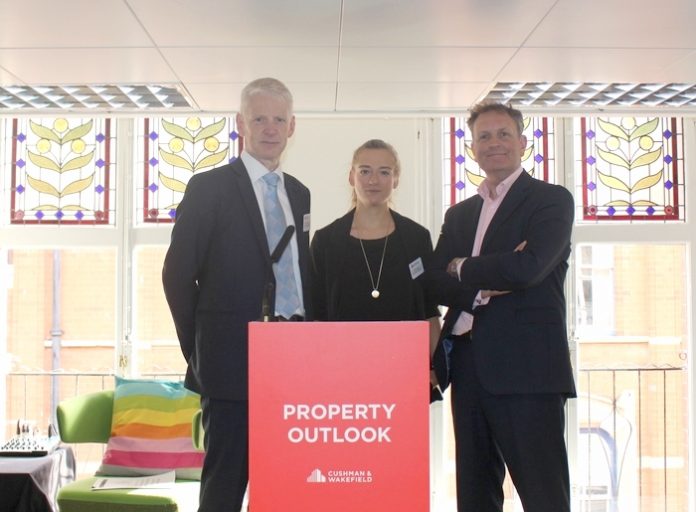
Cushman & Wakefield has presented its Birmingham Property Outlook for 2018 and beyond. The breakfast presentation, held at The Studio in Birmingham city centre, revealed that the commercial property market in the West Midlands is well placed to benefit from changing market dynamics.
David Tonks, Head of Cushman & Wakefield’s Birmingham office began the event with an overview of the West Midlands market and how it is set to perform this year and beyond which was followed by presentations from Kat Hanna from Cushman & Wakefield’s Insight & Research team and Richard Golding, Head of Occupier Services on ‘People – People – Technology’.
David Tonks said: “Against a backdrop of modest economic growth, predictions for the next 12 months sentiment in the Midlands property market remain positive. There are a number of challenges in the market including the full impact of Brexit which has undoubtedly slowed decision making and political risks at home and abroad but we are not expecting recessionary pressures in the foreseeable future.”
His presentation revealed that the logistics sector continues to be the most sought after asset class in the investment market closely followed by well-let city centre offices which continue to attract strong interest.
He continued: “The logistics market has just had its best quarter for five years and there do not seem to be any obvious signs of this market slowing down. Challenges exist principally around the supply of land in the face of strong demand from the e-tailing sector and also from automotive and aerospace companies from the manufacturing sector. Similarly, off the back of a very strong 2017, take-up in city centre office markets remains strong whilst supply in certain sectors is constrained.
“Strengthening demand from the serviced office sector shows little sign of abating in response to the changing preferences of office occupiers who are keen to tap into the range of services, technology and personnel to be found within the serviced community. This trend has the potential to be one of the biggest market disruptors that we will see this decade.”
The challenges faced by the retail sector look set to continue and there is an increasing threat of over-supply within some locations as the trend towards consolidation continues.
“There is little distinction between different property uses and we continue to see mixed-use schemes emerge in response to occupier trends. Hotels are judged by the quality of the workspace, co-working is judged by the quality of the food and beverage offer and the shift towards communal services within the residential world looks certain to continue.
“Against this backdrop Birmingham is clearly well placed to benefit from the changing market dynamics. The city has an undoubted competitive edge in terms of the financial headlines and its demographic profile. Furthermore, the strong supply of space in the city centre office market, the industrial land at Peddimore and range of potential uses at Smithfield for example, will undoubtedly underpin the strength of the city’s proposition. HS2 is now less than 10 years away, the expansion of the Metro will be concluded in less than four years and the capacity of Birmingham Airport certainly all combine to make the region attractive to inward investors.
He added: “The big challenge for the Combined Authority is to build upon this momentum. The build up to the Commonwealth Games will help in this regard with the prospect of almost 1 million visitors per day and global TV coverage.”
Kat Hanna and Richard Golding gave a thought provoking presentation on how dynamics between People, Power and Technology will have huge implications for the real estate sector.
Kat Hanna said: “It’s increasingly important that we understand as a sector how trends in online consumption and new business models are affecting demand for physical space. When it comes to sectors like retail, it is not as simple as online replacing physical. Rather, it’s about the blurring of activities taking place both online and in the physical world. The prize will go to those developers and landlords who understand how best to meet the needs of occupiers in this increasingly blended environment.”
Richard Golding added: “The speed and impact of disruption, for many occupiers, is part of their day to day operations. However, the real estate markets needs to adapt to support organisations who want to be agile, create flexible environments and deliver space that enhances productivity and retains the best people.
“Service, simplicity and speed is at the heart of everything they do, but the real estate dynamics aren’t always aligned to this. Some occupiers are having to look at alternative solutions and this will continue until the traditional market adapts.”


















